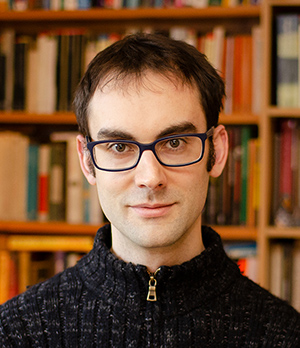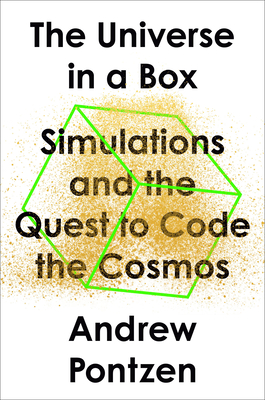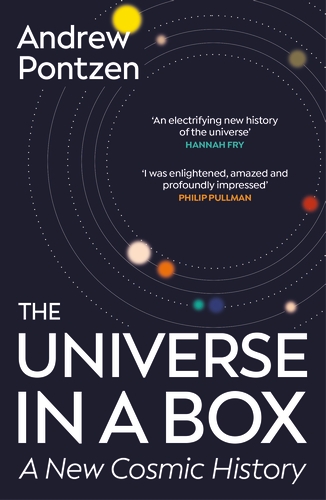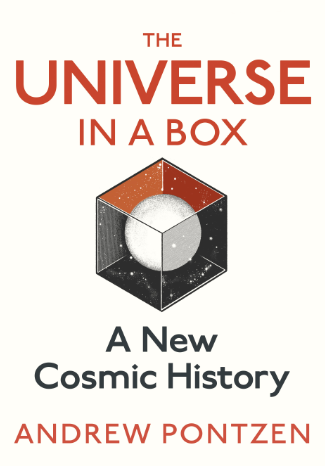
Hello
I’m a Professor of Cosmology, and director of the Institute for Computational Cosmology at Durham University.
I have recently written a non-fiction book explaining what we do, and my research is currently supported by the ERC. Previously I was a Professor and Royal Society University Research fellow at UCL, where I co-led the Cosmoparticle Initiative. Prior to that, I held junior fellowships in Oxford and Cambridge. And I'm the lead author of some widely used scientific software.
Book



My debut non-specialist book, The Universe in a Box, is out now.
It's a book all about cooperation — how everything from quantum particles to black holes work together to produce the incredible, complex, evolving universe. But it's also about cooperation between people, and how 21st century technology is changing humanity’s conception of our origins, of science and of reality itself.
It's currently available in the UK, USA, Canada, Australia and New Zealand and in translation in Spain, Holland, Italy and South Korea. Further translations are coming soon.
I've talked about it at the Royal Institution (see video) and on a number of podcasts including Spectator books (best if you're new to this topic) and Sean Carroll's Mindscape (goes a little more in-depth).
‘Changing and expanding our understanding of the universe... bounces along with an admirably light touch’ — The Times (London)
‘Elegantly written... exhilarating, candid reports from cosmology’s front lines’ — The Wall Street Journal
‘A veritable treasure chest filled with captivating stories... offers a profound reflection on our human quest to understand the cosmos.’ — Science
‘Weaves hard science and dense theory into a gripping narrative... Pontzen makes the complicated comprehensible.’ — New Scientist
‘A truly excellent exposition of a fascinating, little-understood, and very important scientific activity. I was enlightened, amazed, and profoundly impressed. I've seldom seen a book (and this is an age of really good writing about science for the general public) so clear, so vivid’ — Philip Pullman
‘An electrifying new history of the universe and how it all fits together, and of the human effort to unlock its mysteries’ — Hannah Fry
‘Andrew Pontzen gives a vivid perspective on what it's like to be a scientist trying to model the universe — and doesn't shy away from highlighting the mysteries that are coming into focus. This fascinating book, written with clarity and zest, deserves wide readership’ — Martin Rees
‘Forget telescopes and microscopes. Pontzen's laboratory sits inside his computer and it is quickly becoming the most important tool in science.’ — Jim Al-Khalili
‘Pontzen excels at translating quantum physics and other difficult concepts into lay-friendly terms... this look at the cutting edge of astronomy fascinates.’ — Publishers Weekly
‘A joyride through the history of cosmic simulations, taking in weather forecasting and climate models, the mysteries of dark matter, dark energy and black holes, quantum mechanics, multiverses and artificial intelligence – all between the covers of a single book!’ — Ananyo Bhattacharya
‘Compelling.... This book is a testament to the amazing potential of simulations to reveal new truths about the world around us and our place within it. An enthralling analysis of simulation, a formidable technology that may usher in a new era of cosmology.’ — Kirkus Reviews
Featured in the Financial Times Best summer books of 2023
‘Brilliantly keeping complex topics grounded... very personal, heart-warming and even touching’ — BBC Sky at Night Magazine book of the month July 2023
‘A vivid and eye-opening account of one of the least understood yet most important tools in contemporary science, Pontzen’s highly engaging book guides the reader through the history of cosmic simulations.’ — Waterstones best books of 2023
‘This accessible book is not just about cosmology... [but] simulations in all kinds of fields, from weather, chemistry and ecology to human thinking itself. It is refreshing that Pontzen keeps insisting on the difference between simulation and reality’ — de Volkskrant (in Dutch)
‘A fascinating book that explains how humanity's advances in space exploration, computational calculations, and the development of artificial intelligence have contributed... to addressing the complexity of the Universe’ — la Repubblica (in Italian)
I have in the past worked with schools and science organisations to help bring the excitement of cosmology into STEM education. You can find online archives of some of my work with organisations like the Royal Institution and TED-ED. I've also presented for science festivals and for media organisations including BBC Radio 4 and World Service, New Scientist, Guardian Live, Discovery Channel and Amazon Prime Video.
I am represented by Chris Wellbelove at Aitken Alexander Associates.
Research
I have a broad range of research interests at the interfaces between astrophysics, high energy physics, cosmology and computation.
Our current theory of the Universe, built on Einstein’s general relativity, accounts for many observations to a high degree of accuracy. However, it describes a cosmos in which 95% is composed of dark matter and dark energy; the nature of both these components is unknown and, as yet, described only in a phenomenological way. Moreover, galaxies and other structures in the Universe are thought to have been seeded by an early period of ‘inflation’, the physics of which is also speculative and poorly understood.
To make progress, we must connect astronomical observations, laboratory physics, and simulations of structure growth. My research uses numerical and analytic methods to provide these links, in several strands:
- The GM Galaxies programme focuses on developing ‘genetically modified’ simulations, which allow systematic exploration of the relationship between cosmic histories and the observable traits of galaxies, clusters of galaxies, and large scale filaments and voids.
- The QSimFP project is using quantum technologies to mimic, in the laboratory, fundamental physical processes. My own interest is in false vacuum decay, a ubiquitous phenomenon that may even have given rise to our entire Universe.
- I collaborate on topics ranging from quantum information theory to interpretable machine learning techniques.
- I am also active in interpreting data from cosmological surveys, including CMB and Lyman-alpha forest data. I develop techniques to improve accuracy and precision of physical interpretations of these surveys, and use relativistic modelling to make predictions for effects that extend beyond standard models of cosmology.
Teaching
I am an experienced teacher of undergraduate and graduate level physics.
I currently lecture electromagnetism for first year undergraduates at Durham University. I previously ran an Advanced Physical Cosmology for fourth year undergraduates and postgraduate students from UCL and other Colleges across London.
Before that, I taught various maths and cosmology courses. I am a Fellow of the Higher Education Academy.
Software
I am the primary author and maintainer of tangos and pynbody, codes for analysing the output from numerical simulations. Pynbody has been acknowledged in almost 300 publications across multiple fields. The GM Galaxies project has recently also published our initial conditions generator, genetIC.
Contact
For queries related to The Universe in a Box, in the UK please contact Joe Pickering at Vintage, or in the US please contact Shailyn Tavella at Riverhead Books. For queries about corporate speaking engagements, please contact Chris Wellbelove at Aitken Alexander.
Otherwise, you can reach me by email or for code-related problems and queries, please open a github issue.
 The Royal Society
The Royal Society Science and Technology Facilities Council
Science and Technology Facilities Council UK Research and Innovation
UK Research and Innovation UCL Provost Strategic Development Fund
UCL Provost Strategic Development Fund